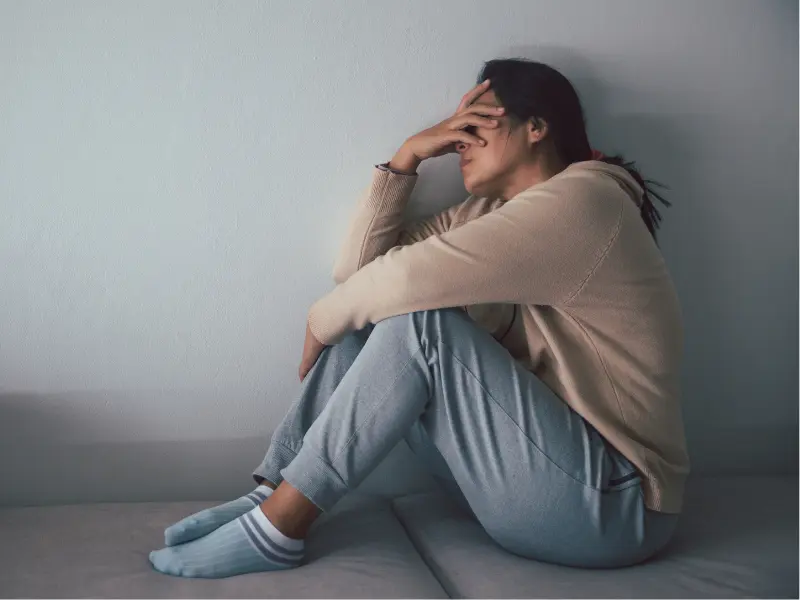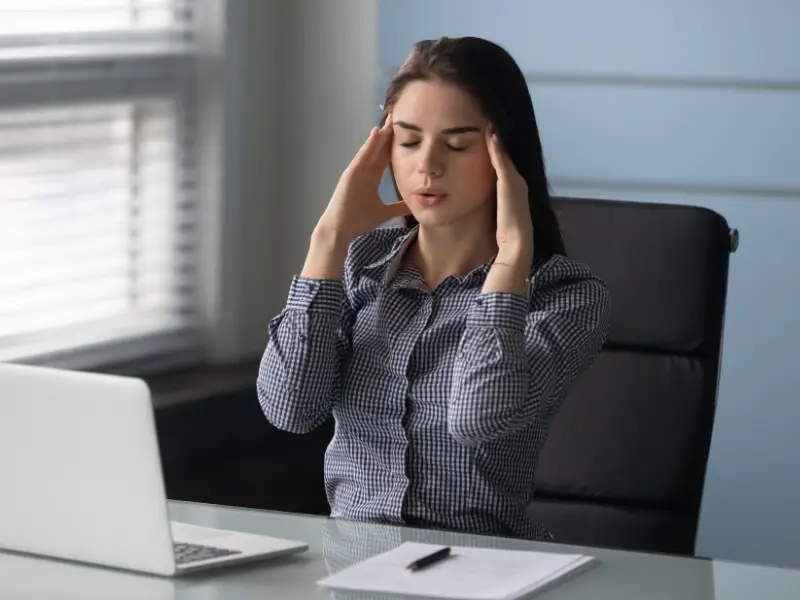Anxiety disorders, a condition that affected 301 million adults in 2019, are more common than you might think.
Globally, anxiety disorders are the sixth leading cause of disability, affecting people from all walks of life.
Anxiety comes in many different forms, from mild to debilitating, and it can have a severe impact on our health if left untreated.
In this post, we’ll examine how this mental problem can affect our physical health in the short and long term.
We’ll also discuss some tips for managing anxiety and improving overall health and well-being.
What Is Anxiety
It’s okay to feel anxious. Anxiety is a normal, healthy emotion that everyone experiences at one point or another.
It’s a feeling of worry, nervousness, or unease about something with an uncertain outcome.
Adults usually worry about work deadlines, public speaking, or family conflicts. For instance, a looming project deadline at work or a disagreement with a family member can trigger feelings of anxiety.
Kids and teens may feel anxious about starting school, tests, or fitting in with peers. Signs of anxiety in children and teens can include frequent stomachaches or headaches, avoidance of certain situations, or changes in behavior or mood.
Everyone experiences anxiety differently, but there are some common symptoms.
These include feeling restless or irritable, having trouble concentrating, feeling tense or “on edge,” and experiencing difficulty sleeping.
The Difference Between Stress and Anxiety

There’s a big difference between everyday stress and anxiety.
Stress is a response to a new or challenging situation. It motivates us to take action, and it generally goes away once the stressful event is over.
Anxiety is different. It’s a sustained worry, fear, or dread about something that may be hard to control or predict. It can also interfere with daily activities such as work, school, or spending time with friends.
Long-term stress can trigger anxiety disorders, and going through a traumatic event can also trigger them.
Anxiety and Health Effects
While stress can be beneficial in some situations (e.g., motivating us to study for an exam), it can also be debilitating when severe and chronic.
When fear is overwhelming and interferes with our daily lives, it may be classified as an anxiety disorder.
Anxiety disorders are the most common type of mental health disorder, affecting millions of people.
The most common types are generalized anxiety disorder, panic disorder, separation anxiety disorder, obsessive-compulsive disorder, post-traumatic stress disorder, and social anxiety disorder.
Each of these disorders has its unique symptoms and triggers, but they all involve excessive fear or worry that is difficult to control.
Chronic anxiety can lead to issues with the cardiovascular, digestive, immune, respiratory, and other systems in the body.
It can also lead to physical symptoms like headaches, muscle tension, insomnia, and depression.
This can lead to several consequences, such as a higher risk of heart disease, gastrointestinal issues, and respiratory problems, such as chronic obstructive pulmonary disease.
It can also make it more difficult to fight off infections and can worsen existing medical conditions.
What To Do If You Suspect You Have An Anxiety Disorder
Fear and worries are normal emotions everyone experiences at different points in life.
However, this can become a disorder when it interferes with daily life.
If you think you may have a problem, there are a few things you can do to get help.
First, talk to your doctor. They can rule out other medical conditions causing your symptoms and refer you to a mental health specialist.
You can also seek out support from a therapist or counselor who can help you manage your anxiety.
Second, many anxiety-reducing techniques, such as relaxation and breathing exercises, journaling, and spending time in nature, can be helpful.
How To Treat Anxiety Disorders

There are many effective ways to deal with anxiety, and the best approach may vary depending on the individual. Here are a few anxiety-reducing techniques:
Exercise
Exercise is an effective treatment for stress.
It helps to reduce stress symptoms by providing a distraction from anxious thoughts, releasing endorphins that boost mood, and increasing body temperature, which has calming effects.
Exercise also helps to improve sleep quality, which can be an essential factor in reducing worrisome thoughts.
In addition, exercise can help to build confidence.
Relaxation Techniques
There are many different relaxation techniques, and some may work better than others for certain people.
Deep breathing exercises can help slow the heart rate and calm the nervous system.
Progressive muscle relaxation involves tensing and relaxing different muscle groups in the body. This can help to reduce stress and tension throughout the body.
Visualization involves picturing oneself in a calm and peaceful place. It can help to distract the mind from anxiety-inducing thoughts and relax the body.
Relaxation techniques can be very effective in helping to manage fear and promote calmness and peace of mind.
Cognitive-Behavioral Therapy
Cognitive-behavioral therapy, or CBT, is a type of psychotherapy that can be very helpful in treating panic attacks.
CBT focuses on changing the negative thought patterns and beliefs that contribute to anxiety. For example, someone with anxiety might believe that they are in danger even when there is no real threat. CBT can help them to challenge and change this belief.
In addition, CBT can help people with anxiety to manage and cope with their symptoms.
This might involve learning relaxation techniques or exposure therapy, which involves gradually facing the things that trigger anxiety.
Medication
In some cases, mental disorders may be treated with medication.
There are several different types of anxiety medications, each of which works in a slightly different way. However, all of them work by helping to reduce the symptoms of anxiety and make it more manageable.
For some people, medication can be a lifesaver, allowing them to live relatively everyday lives despite their anxiety.
For others, it may only be a temporary solution until they can find other ways to cope with their anxiety.
What Happens If Anxiety Is Not Treated
Anxiety left untreated can have many negative consequences on your health.
One such consequence is that it increases your risk of developing certain illnesses.
This is because chronic stress, which may be associated with anxiety, can compromise your immune system. This makes you more susceptible to infections like colds, the flu, and other viral and bacterial diseases.
In addition, fear can also lead to physical symptoms such as headaches, chest pain, and stomach problems.
Left untreated, this can lead to severe complications, including:
- Difficulty concentrating or paying attention
- Sleep problems
- Missed days at work or school
- Relationship problems
- Substance abuse
- Social isolation
- Chronic physical health problems
How To Help Someone Who Has Anxiety

If you have a friend or loved one who is struggling with anxiety, there are ways you can help.
First, try to understand what they are going through. Anxiety can manifest itself in different ways, so it is essential to learn about the symptoms your friend is experiencing. This will help you better support them.
Secondly, offer a listening ear. Sometimes, being there to talk and listen can be a huge help.
Finally, encourage them to seek professional help if they are struggling. A therapist can provide additional support and guidance.
If you want to help someone, remember to be patient and understanding. Your support can help them get through this tough time.
Six Valuable Tips
Anxiety disorders exist on a spectrum, and the symptoms can vary significantly from person to person.
For some, anxiety may be relatively mild and manageable. For others, it can be debilitating and significantly impact daily life.
Whether you are dealing with anxiety yourself or trying to help someone else with their anxiety disorder, here are six valuable tips:
1. Identify Your Triggers
If you’re struggling with excessive anxiety, one of the first steps to managing it is to identify your triggers.
Triggers are anything – from a person, place, or thing – that sets off fear or stress.
Once you know your triggers, you can work on avoiding them or learning to deal with them more positively.
For example, if you’re anxious about large crowds, you might try attending events with a friend or family member who can help you stay calm.
If you’re anxious about public speaking, you can practice your skills by attending a local Toastmasters club.
By identifying and addressing your triggers, you can take a step towards managing your anxiety symptoms more effectively.
2. Make Time For Yourself
If you find yourself struggling to manage troubling thoughts, it is essential to prioritize time for self-care.
This can mean taking time each day to do something you enjoy, setting aside time each week to relax and unwind, or committing to taking a vacation once a year.
By making time for yourself, you can help reduce stress and anxiety levels, which can in turn help reduce the frequency and intensity of worrisome thoughts.
In addition, taking periodic breaks from work or other responsibilities can help refresh and rejuvenate your mind, improving your ability to cope with stressful situations.
If you struggle to make time for yourself, consider scheduling some “me time” into your weekly schedule or plan a weekend getaway with friends or family.
3. Connect With Others
Spending time with family and friends can help to reduce stress and promote positive social interactions.
Additionally, connecting with others can help provide support and understanding, which can be invaluable when dealing with mental health conditions.
Connecting with others can also help to provide a sense of community and belonging, which can contribute to overall mental health and well-being.
4. Avoid Alcohol And Drugs
People with anxiety disorders may be tempted to use alcohol or drugs to cope with their symptoms.
Not only are these substances ineffective in addressing the root cause of anxiety, but they can also create new problems and make anxiety worse in the long run.
If you’re struggling with anxiety, it’s essential to seek out healthy coping strategies such as exercise, relaxation techniques, and counseling.
Avoiding alcohol and drugs is an essential part of managing mental health healthily.
5. Get Enough Sleep
Anxiety disorders tend to disrupt sleep patterns, making it challenging to get enough rest.
However, getting adequate sleep is crucial for managing anxiety and maintaining good mental health.
Lack of sleep can cause irritability, difficulty concentrating, and increased anxiety symptoms.
Try establishing a regular bedtime routine and practicing relaxation techniques before bed to improve your sleep.
Additionally, avoid caffeine and electronics close to bedtime as they can interfere with your ability to fall asleep.
6. Eat Healthy
A healthy diet is an integral part of managing anxiety.
Eating a balanced diet with plenty of fruits, vegetables, and whole grains can help improve mood and reduce stress levels.
There are a few specific nutrients that are especially important for anxiety management.
Omega-3 fatty acids, magnesium, and probiotics are all known to help reduce anxiety levels.
To include these nutrients in your diet, eat broken flax seeds, walnuts, leafy greens, whole grains, and dark chocolate.
In addition to eating a healthy diet, it is also important to eat regular meals. Skipping meals can cause blood sugar levels to drop, which can trigger anxiety symptoms.
Conclusion
Anxiety disorders are a common mental health condition that can significantly impact an individual’s daily life.
If you or someone you know is struggling with anxiety, it is essential to seek professional help and support.
By understanding the symptoms, identifying triggers, and implementing healthy coping strategies, individuals can manage their anxiety effectively and improve their overall well-being.
Remember to prioritize self-care and reach out to loved ones for support during difficult times. With proper management and treatment, those living with anxiety disorders can lead fulfilling lives. So don’t be afraid to seek help and take care of yourself!

